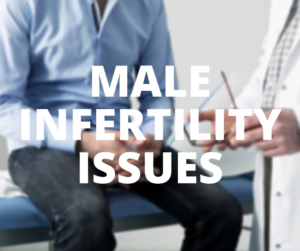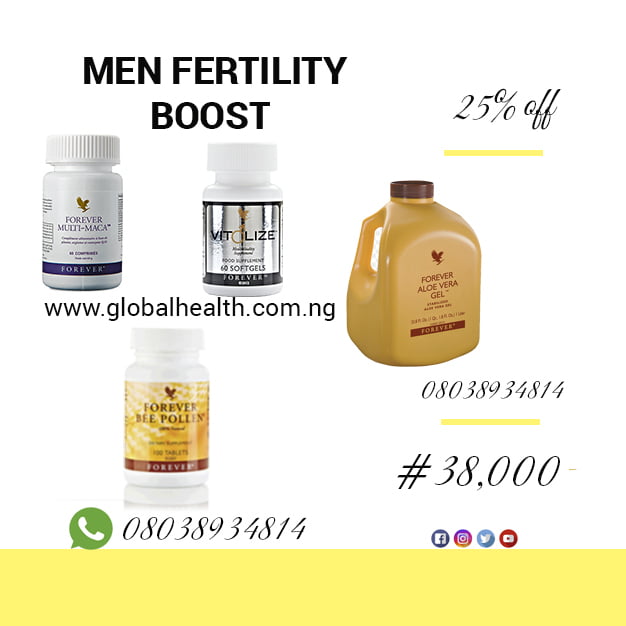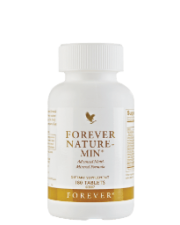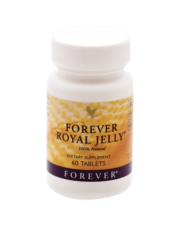FOREVER FERTILITY BOOST FOR MEN
Causes of infertility
Age
Healthy men in their 70s and beyond can still father children however the time taken to cause a pregnancy is longer from middle-age onward. The potential reasons for this include a decrease in sexual activity, semen volume, sperm motility (movement), the total number of motile sperm and possibly sperm
function and DNA quality.
Obstructive problems
Blockage in a sperm-carrying tubes due to –
– Groin surgery (including hernia repair and fixation of undescended testicles).
– Trauma to the scrotum sack covering the testicles (even fairly minor sporting injuries).
– Infection (particularly chlamydia, gonorrhoea and tuberculosis).
– Previous vasectomy (a form of contraception that involves tying the sperm-carrying tubes).
Congenital problems
– Absence of the vas deferens on one or both sides. (The vas deferens is the tube that conducts the testicular component of semen to the urethra, which then carries semen through the penis to the outside world.)
– Absence of seminal vesicles (where other semen components are made)
Other obstructive cause
– Berry-Perkins-Young syndrome, in which sufferers have a chronic chest disease (bronchiectasis), chronic sinusitis and obstructive infertility.
Testicular injury and disease
– A blow to the testicles, which may occur in sport or during a fight, can cause swelling of the testicles, or bleeding in or around them. This probably causes the blood supply to the testicles to fail, resulting in permanent damage to the sperm production mechanism.
– Torsion of the testicles (twisting of a testicle on its cord) can have a similar effect if it is not treated very quickly with surgery.
– Viral infections can cause inflammation of the testicles (orchitis, which usually appears as painful swelling of the testicles) and failure of sperm production.
– Mumps affect fertility if it causes orchitis.
– Undescended testicles (cryptorchidism) may lead to failure of sperm production.
Varicocele
Varicocele is dilation of the testicular veins in the spermatic cord that leads from the testicles to the abdomen. Varicocele may be either one sided or occurs both sides, but more common on the left.
Varicocele either heats up the testicles or impairs their blood supply thus affecting fertility. The co-existence of other risk factors, such as smoking, with varicocele seems to have a greater effect on the risk of infertility.
Sperm disorders
– Azoospermia
Absence of sperms, In case of azoospermia homoeopathic treatment is highly hopeful.
– Oligospermia
Meager number of sperms.
– Astheno sperm
Sperms with feeble mobility. This may be sometimes due to the dilated and tortuous condition of the veins of the testis- varicocele. This can be managed very well with homoeopathic medicines by evading surgery.
– Teratospermia
Structural malformations of the sperms.
Genetic disorders
– Chromosome disorders
Can affect their fertility in various ways:
– affect the development of the testicles.
– Klinefelter’s syndrome
FOREVER FERTILITY BOOST FOR MEN
In this disorder, instead of having 46 chromosomes, including one X and one Y chromosome (46XY), the man has an additional X chromosome (47XXY).
– can disrupt cell division and sperm production.
Problems with erection and ejaculation
– Erectile dysfunction (inability to attain or maintain an erection adequate for intercourse)
– Premature ejaculation
– Failure to ejaculate
– Inability to achieve vaginal penetration
Hormonal problems
– Testosterone deficiency
It can reduce fertility and may be caused by problems with testicular testosterone production, or problems with the pituitary gland or hypothalamus in the brain, which control testosterone production.
– Overproduction of prolactin (hyperprolactinaemia),
A hormone produced by the pituitary gland, may also reduce fertility.
General medical disorders that reduce fertility
There are several conditions that may reduce fertility:
– Fever
Influenza (flu), pneumonia, or even a severe cold can cause a high fever, which will adversely affect sperm production and quality. These changes usually recover over a few weeks.
– Diabetes
It can cause problems with erection and ejaculation through causing damage to the function of the ‘automatic nervous system’.
– High blood pressure
Hypertension (high blood pressure) can cause problems with erection, either directly or as a side effect of medication.
– Coronary artery disease
Coronary artery disease can cause problems with erection. This could be due to generalized hardening of the arteries, in the penis as well as the heart, or to drugs used in the treatment of heart problems.
– Neurological disorders
Multiple sclerosis, stroke, and spinal cord injury and disease can all cause problems with erection and ejaculation.
– Kidney disease
Chronic renal failure, which results in a build up of waste products in the body, can adversely affect sperm quality and fertility. It can also cause erection problems.
– Cancer
Cancers that affect the genital tract or endocrine (hormone-producing) systems may directly reduce fertility. Otherwise, drugs and radiation used to treat cancer may severely reduce sperm production or even stop it altogether. Stress (see below) may also have an effect.
– Alcoholism
Alcohol is toxic to sperm and overuse of alcohol can reduce sperm quality and fertility.
– Stress
Stress causes several hormonal changes in the body that can affect fertility. Stress can have many causes, including anxiety over fertility problems.
– Bad habits
Alcohol – Reduces sperm count and quality
Tobacco – May reduce sperm motility
Marijuana – affects hormone production
Opiates (heroin, morphine) – Affects hormone production
– Medicine
Anabolic steroids – Affect hormone production
Amiodarone – Inflammation of the testicles and epididymis (epididymo-orchitis) leading to problems with sperm production
Cancer chemotherapies – May severely reduce sperm count, quality and motility. Effects may be permanent
Colchicines – May severely reduce sperm count
Digoxin – Affects hormone production Heart failure
Erythromycin – May reduce sperm count
Gentamicin – Reduces sperm count
Hormonal therapies – May disrupt other hormone production
Ketoconazole – Reduces sperm count
Methotrexate – Reduces sperm count
Nitrofurantoin – Reduces sperm count
Phenytoin – Reduces sperm quality and motility
Spironolactone – Affects hormone production
Sulphasalazine – Reduces sperm count and quality
– Environmental toxins and radiation
Environmental toxins that may affect fertility
Alkylphenols, Dioxins, Organochlorine pesticides (Lindane, DDT) etc.
Signs or symptoms of male infertility
In most cases, there are no obvious signs of an infertility problem.
Intercourse, erections and ejaculation will usually happen without difficulty. The quantity and appearance of the ejaculated semen generally appears normal to the naked eye.
FOREVER FERTILITY BOOST FOR MEN







Reviews
There are no reviews yet.